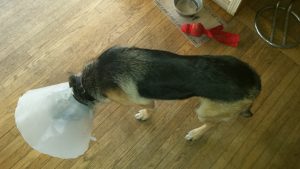Vet Sci 101 – How to Advocate for Your Pet After Surgery
- Understand the medications you’ll be giving your pet. Make sure you know how much and when to give, and understand how it is to be administered. Don’t be afraid to ask your Vet or Vet Tech to demonstrate how best to apply meds like ointments or drops. Also be sure to ask how to recognize side effects. If your pet also has a chronic health condition for which they are already taking a medication, it doesn’t hurt to ask your Vet Team if you should expect any potential drug interactions.
- Understand your pet’s surgical site. In other words, discuss any incision with your Vet Team; how many and what kind of stitches? Will they need to be pulled in 7-10 days or will they dissolve on their own? Should the incision be kept dry or should damp compress be applied in case of swelling, discharge or discomfort? What kind of discharge is normal and what kind is not? Will an e-collar be needed to keep the pet from chewing or licking the incision? Take photos of the incision every day or so in case you need to show them to the Vet.
- Ask your Vet Team how they want you to care for the bandage. How often should it be changed? What if it slips out of position? How to readjust it without damaging the tissue below? Smell the bandage each day…..What kinds of smells should we expect from the bandage as time goes on and what do they mean? If it’s a limb that’s bandaged, learn how to check your pet’s foot for warmth, color and swelling.
- Discuss exercise restrictions. For instance, stomach incisions take about 2 weeks to heal internally, so a pet with such an incision should not be allowed to jump for at least 2 weeks. If walking will be permitted, ask for specific instructions about leash length and recommended duration for walks. Are there any exercises we can engage our pets in that will aid with the pet’s rehabilitation? Ask for a demonstration if you aren’t absolutely clear on any exercises recommended.
- Discuss dietary restrictions with your Vet or Vet Tech. Controlling weight gain during the idle healing period will make it easier for your pet to rise from recumbancy while they’re convalescing. Issues with urinary blockages, kidney or liver dysfunction may require special or prescription food.




